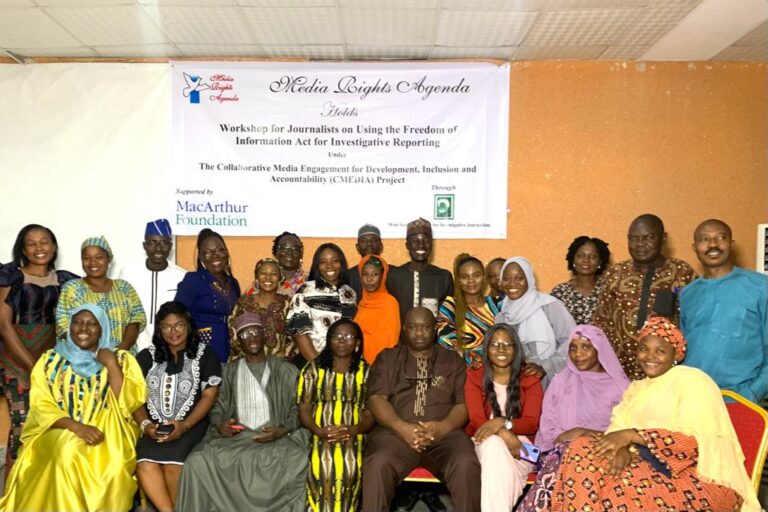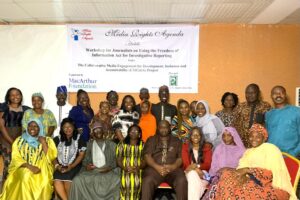Participants at a training workshop made up of journalists from broadcast, print and online media drawn from different states across northern Nigeria have called on civil society organisations to support the media in the exercise and enforcement of their right of access to information, including by providing journalists and media organizations with legal and litigation assistance to challenge any wrongful denial of information under the Freedom of Information (FOI) Act in court.
The participants made this and other recommendations at a two-day Workshop for journalists on how to use the FOI Act for investigative reporting, which took place on October 26, and, October 27, 2023, in Kaduna.
The workshop, attended by 28 participants, was organised by Media Rights Agenda with support from the MacArthur Foundation through the Wole Soyinka Centre for Investigative Journalism (WSCIJ) under the Collaborative Media Engagement for Development, Inclusion and Accountability (CMEDIA) Project, a multi-level intervention that supports media independence, improved transparency, accountability, and good governance in state and local governments with more public awareness on the need for accountability, and amplified marginalised voices.
The two-day workshop was aimed at sensitizing participants as well as building their capacity to use the FOI Act for investigative reporting by familiarizing them with the key provisions of the Act, how to make requests for information under the Act to increase their chances of success, and the enforcement mechanisms and options available to them whenever they are wrongfully denied access to any information requested.
The workshop had plenary presentations and break-out sessions, which treated different topics including: What is Investigative Journalism; Conducting Investigative Reporting; The Role of Records in Investigative Reporting; Understanding the Freedom of Information Act, 2011; The FOI Act and Investigative Reporting; and How Journalists and the Media Can Use the FOI Act.
Other topics treated are: Fact-checking and Investigative Reporting; Making Requests for Information Under the Freedom of Information Act; Deciding What Investigative Reports to Carry Out; Interviews in Investigative Reporting; and How to Present Stories from Investigative Reporting.
The participants observed that despite the clear provisions of the FOI Act, the usage of the Law by journalists and the media remains relatively poor owing to a variety of challenges, including inadequate awareness about the Act and how to use it by media professionals, the lack of willingness by many State governments and public institutions at the Federal level to comply with its provisions.
They also acknowledged the potential of the FOI Act to reveal corruption, abuse of public trust, abuse of power or other wrongdoings and to ultimately push back against corruption while improving accountability in governance.
Theyrecommended that there should be continued sensitization of media practitioners at different levels, from editors and newsroom managers to reporters, on the various tools that they can use to enhance investigative reporting, including the FOI Act.
The workshop concluded that journalists should monitor compliance by public institutions with the duties and obligations imposed on them by the FOI Act, including the designation of Freedom of Information Desk Officers by various agencies of government, the proactive publication of certain classes of information as required by the Act, the submission by all public institutions of their annual implementation reports to the Attorney-General of the Federation; the requirement that public institutions train their personnel and officials on the public’s right of access to information, among others.
Please download and read the full communiqué here.







